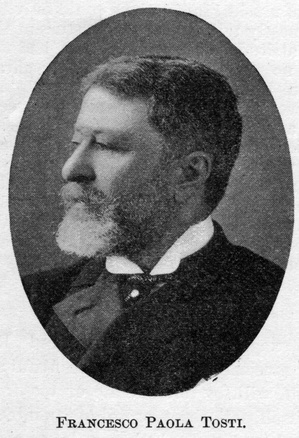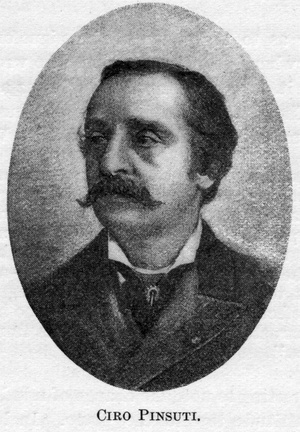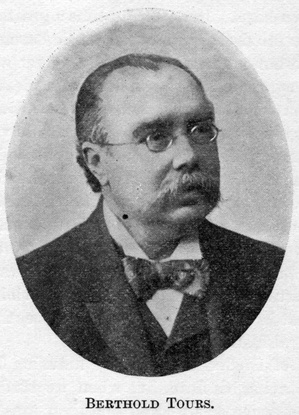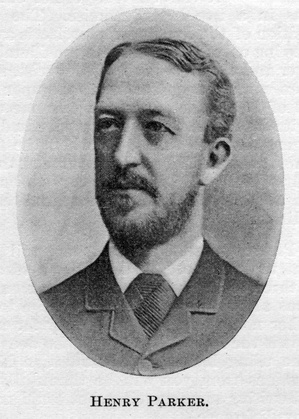BY FARLEY NEWMAN.
FRANCESCO PAOLO TOSTI
 is by no means the least fortunate of the many sons of the sunny south who have been successful in converting the note of Italia’s classic lyre into coin of the realm. Signor Tosti was born at Ortona-sul-Mare, in the Abruzzi, on the ninth of April, 1846. His parents sent him, when twelve years of age, to the Royal College of San Pietro a Majello, at Naples, where his masters were Signor Pinto for violin, and Signori Conti and the erstwhile celebrated Mercadante for composition. It was Mercadante who, observing the youth’s uncommon application and talents, appointed him a maestrino, or pupil teacher, at the college. The distinction was, however, somewhat of a nominal one, considering that the salary attached to this quasi-public office was the magnificent sum of 60 francs per month! Tosti remained in Naples until the year 1869, when, suffering from the depressing consequences of overwork (or, it may be, excess of salary), he repaired to his native town of Ortona, in hope of regaining strength. But here, unfortunately, the vocalists’ bugbear, bronchitis, fastened its venomous fangs upon his depleted frame, so that it was only after a period of seven months that he was sufficiently recovered to journey to Rome and resume work again. Tosti, anxious to turn to advantage some portion of his time during the weary hours of convalescence, bestowed especial care upon the composition of a few songs, among them being the since celebrated “Non M’ama Piu;” but, as usually happens when a composer of real ability pours out his soul and his energies upon a work, the publishers looked askance at these exceptional efforts of Tosti’s genius, and, for a considerable period, declined, politely but firmly, to affix the hall-mark of their names upon poor Tosti’s base metal, as they deemed it to be. However, unprejudiced, unbiased old Father Time (who, by the way, has a cunning ear for a good thing in music) has, as in so many similar instances, completely reversed the verdict of the canny publishers aforementioned during later years.
is by no means the least fortunate of the many sons of the sunny south who have been successful in converting the note of Italia’s classic lyre into coin of the realm. Signor Tosti was born at Ortona-sul-Mare, in the Abruzzi, on the ninth of April, 1846. His parents sent him, when twelve years of age, to the Royal College of San Pietro a Majello, at Naples, where his masters were Signor Pinto for violin, and Signori Conti and the erstwhile celebrated Mercadante for composition. It was Mercadante who, observing the youth’s uncommon application and talents, appointed him a maestrino, or pupil teacher, at the college. The distinction was, however, somewhat of a nominal one, considering that the salary attached to this quasi-public office was the magnificent sum of 60 francs per month! Tosti remained in Naples until the year 1869, when, suffering from the depressing consequences of overwork (or, it may be, excess of salary), he repaired to his native town of Ortona, in hope of regaining strength. But here, unfortunately, the vocalists’ bugbear, bronchitis, fastened its venomous fangs upon his depleted frame, so that it was only after a period of seven months that he was sufficiently recovered to journey to Rome and resume work again. Tosti, anxious to turn to advantage some portion of his time during the weary hours of convalescence, bestowed especial care upon the composition of a few songs, among them being the since celebrated “Non M’ama Piu;” but, as usually happens when a composer of real ability pours out his soul and his energies upon a work, the publishers looked askance at these exceptional efforts of Tosti’s genius, and, for a considerable period, declined, politely but firmly, to affix the hall-mark of their names upon poor Tosti’s base metal, as they deemed it to be. However, unprejudiced, unbiased old Father Time (who, by the way, has a cunning ear for a good thing in music) has, as in so many similar instances, completely reversed the verdict of the canny publishers aforementioned during later years.
A casual introduction to the renowned Sgambati— Italy’s most accomplished pianist, a splendid musician, and principal of the Naples Conservatorio—laid, it may almost be said, the foundation-stone of Tosti’s subsequent good fortune; for Sgambati, discerning the young musician’s exceptional gifts, and having the influence as well as the desire to do him a good turn, organized some concerts on Tosti’s behalf in Rome, which were highly successful, the celebrated maestro even going so far as to compose some songs for the particular display of Tosti’s abilities as a vocalist. The Queen of Italy patronized these concerts, and was so pleased with Tosti’s efforts that she appointed him her teacher of singing, other favors soon following, including his appointment as keeper of the musical archives of the Italian court.
Signor Tosti did not visit London until 1875, but he must have thought it “better late than never,” seeing that he received a cordial reception from the best circles, culminating, in 1880, in his appointment as teacher of singing to the English royal family. The Queen’s mother, the late Duchess of Kent, was, even to her latest years, never weary of listening to Tosti’s delightful vocalization.
Although Tosti has composed music to Italian, French, and English words, his high reputation as a song writer rests chiefly upon his “English” ballads, which, although they can scarcely be described as “national” in style and character, are such melodious, refined examples of sentimental song-form as to almost merit the phenomenal popularity many of them have enjoyed. Tosti has published about 100 songs and vocal duets.
CIRO PINSUTI.
 Ciro Ercole Pinsuti was born at Sinalunga, May 9, 1829, and gave early indication of remarkable musical gifts, since we find him creating quite a sensation at Rome by his performances as a youthful prodigy. Among the many who were struck by the boy’s talent was a Mr. Drummond, a prominent member of Parliament, who brought Pinsuti to London and gave him “bite and sup” in his own house for some years, this kind-hearted patron placing the lad under Cipriani Potter for composition and Blagrove for violin. Later, Pinsuti entered the Conservatorio at Bologna for further study, becoming also a private pupil of Rossini. It was probably to the influence and tutelage of this most genial of maestri that Pinsuti owed much of his suavity and sweetness in melodic writing.
Ciro Ercole Pinsuti was born at Sinalunga, May 9, 1829, and gave early indication of remarkable musical gifts, since we find him creating quite a sensation at Rome by his performances as a youthful prodigy. Among the many who were struck by the boy’s talent was a Mr. Drummond, a prominent member of Parliament, who brought Pinsuti to London and gave him “bite and sup” in his own house for some years, this kind-hearted patron placing the lad under Cipriani Potter for composition and Blagrove for violin. Later, Pinsuti entered the Conservatorio at Bologna for further study, becoming also a private pupil of Rossini. It was probably to the influence and tutelage of this most genial of maestri that Pinsuti owed much of his suavity and sweetness in melodic writing.
In 1848, Pinsuti, deeming himself fully justified in starting as a “duly qualified practitioner,” established himself in London as a teacher. Very soon, however, the great success of his compositions, more especially his songs and concerted vocal music, caused him to devote himself mainly to composition, although he accepted a professorship at the Royal Academy of Music, and was in great request for private lessons.
Having, in 1885, amassed a comfortable fortune, he decided to spend his remaining years, which, unfortutunately (sic), were to be but few, in his native city, Sinalunga. Subsequently, however, he removed to Florence, where he expired suddenly on the eleventh of March, 1888, from an attack of cerebral apoplexy—almost in harness, as it were, for he was seated at his piano when the attack seized him.
The popularity of many of Pinsuti’s songs and vocal works was and is prodigious, and he possessed in a unique degree the happy knack of pleasing both the cultured musician and the uninformed lover of melody. He was particularly conscientious and careful in his method of composition, insisting upon letting some time elapse between the completion of a work and its publication; arguing, as he did, very justly, that the composer’s perceptiveness is blunted to the true merits or shortcomings of a work by the time he has finished it, from his having gone over it so many times and allowed it to possess his thoughts so exclusively.
Pinsuti composed two operas (produced in Bologna and Milan respectively), a “Te Deum” (written for a patriotic occasion), about 45 part songs, and something like 250 songs. He was also distinguished socially as a “Knight of the Crown of Italy.”
BERTHOLD TOURS
 was certainly one of the most admirable and gifted “middle-class” musicians of the century. A Hollander by birth (he first saw the light at Rotterdam, December 17, 1838), he became an Englishman by adoption and naturalization, his patient, painstaking, and valuable services to his beloved art dating from his migration to “‘the smoky little village on the banks of Father Thames ” in the year 1861.
was certainly one of the most admirable and gifted “middle-class” musicians of the century. A Hollander by birth (he first saw the light at Rotterdam, December 17, 1838), he became an Englishman by adoption and naturalization, his patient, painstaking, and valuable services to his beloved art dating from his migration to “‘the smoky little village on the banks of Father Thames ” in the year 1861.
Berthold Tours, as with so many distinguished musicians, came of an illustrious musical stock, his father (himself the successor of a long line of clever musicians) having been organist of St. Lawrence’s church, Rotterdam. After studying under his father and Verhulst, he was sent to the Conservatories of Brussels and Leipsic respectively, although there is no evidence of his having displayed any noticeable signs of genius during his early years. He was always a patient, plodding student and worker, exemplifying in his particular bent some of the most salient and admirable characteristics of the people of his Fatherland. After leaving Holland, Tours spent two years in Russia in the service of the music-loving Prince Galitzin, after which he decided to try his fortunes in London, forming the common-sense resolve to become a musical “Jack-of-all-trades,” as fortune might decide for him—to play, to teach, to conduct, to compose, to write—anything; in brief, to turn an honest musical penny. After playing violin in the band of the Adelphi Theater and at Alfred Mellon’s concerts, Tours was fortunate in obtaining an introduction to Sainton, who evinced his interest in the young Dutch musician by getting him a desk in the band of the Royal Italian Opera—a position which soon proved for him quite an “open sesame” to higher and better things, the principal of which was the selection of Tours to become the “understudy” of Barnby in the onerous duties of musical adviser and editor to Messrs. Novello & Company. Tours was eminently well endowed and qualified for this position, which he retained when Barnby was succeeded by Sir John Stainer in 1875. By a kind of “natural selection,” or “survival of the fittest,” Tours succeeded Stainer as “ruler of the roost” in 1877, a position which he retained until his death, March 11, 1897.
Tours, as an arranger of piano accompaniments from orchestral scores, displayed exceptional judgment and taste, while in his position as adviser and reviser to Novello’s, his unassuming temperament and kindness of heart endeared him to many a callow composer, for, in his observations and criticisms, he never failed to temper justice with mercy.
Tours, in addition to editing, arranging, and revising an almost countless number of works for publication, also composed a voluminous collection of songs, anthems, hymn tunes, and short instrumental pieces, all of which are characterized by refinement of melody, originality of harmonization, and admirable workmanship generally.
HENRY PARKER
 has labored hard for the large measure of success which has at length crowned his efforts, no inconsiderable portion of his fifty years of life having been given up to hard study and exacting professional work.
has labored hard for the large measure of success which has at length crowned his efforts, no inconsiderable portion of his fifty years of life having been given up to hard study and exacting professional work.
Mr. Parker’s early musical experiences were as a chorister at the popular London church, All Saints, Margaret Street, after which he studied with once celebrated John Hullah.
Almost immediately after Sullivan had finished his curriculum at Leipsic, Henry Parker entered the famous German music school for three years’ study, his masters being Plaidy, Richter, Moscheles, and Hauptmann. Mr. Parker says that when he entered the Conservatorium the professors were laying their wise old heads together and predicting wonderful things for “that young fellow, Arthur Sullivan”—which goes to prove that musical prophets do occasionally hit the nail of truth on the head!
Mr. Parker’s main object in journeying to Leipsic was to obtain advanced tuition upon the violin, he, as a good ordinary player, having already occupied a desk in every orchestra of importance in London; but after arrival, and after he had modestly and impartially compared his chances of violin virtuosity with the many exceptionally clever students he found working away indefatigably there, he decided to relinquish the fiddle for composition and pianoforte playing, his success in the latter being so marked that when he at length returned to his natal shores he was offered and he accepted a large number of engagements as pianist at good concerts, including the important post of accompanist at the Boosey Ballad Concerts.
After some years of conducting, composing, and teaching, the large sales attained by one after another of Mr. Parker’s songs justified him in devoting the bulk of his time to composition, although he still retains his professorship of singing at the Guild hall School of Music, where his lessons are in great request.
Some of Mr. Parker’s vocal works have enjoyed exceptionally large sales; as, for instance, “Close to the Threshold,” with 140,000 copies, “Jerusalem,” 80,000 copies, “At My Window,” with a number almost incalculable, etc. Mr. Parker is, moreover, entitled to the distinction of having written the vocal duet which has had, and is still having, the largest sale in the world of any similar composition. This is the charming and perenially popular “In the Dusk of the Twilight.” It is worth mentioning, in connection with this, in corroboration of our opening observations on the absolute impossibility of any one being able to predict before publication the success or failure of a vocal work, that the writer had it on the authority of the composer himself, that when the sales of this duet continued to increase, month by month, in an astonishing numerical crescendo, no one was more astonished than Henry Parker himself. (It should be borne in mind that the figures mentioned above do not include the vast numbers of copies of Mr. Parker’s songs sold in the United States.)
At the present time Mr. Parker has a two-act opera on “old English” lines, entitled “Kitty,” touring in the provinces, and from its warm welcome at the hands of our country neighbors, great expectations are indulged concerning its forthcoming production in London. In view of the composer’s great gifts as a melodist and wide experience of operatic music generally (he has “conducted” every serious opera of note during the past), these rosy anticipations seem well grounded.
Personally, Henry Parker is one of the most genial and unassuming of musicians, brimming over with amusing and interesting anecdotes of celebrated singers and instrumentalists he has known, the moral being occasionally pointed and the tale adorned with sage observations on the musical art and artists of to-day.



